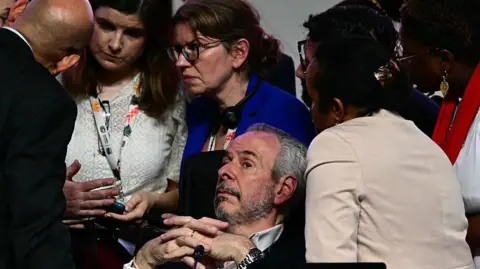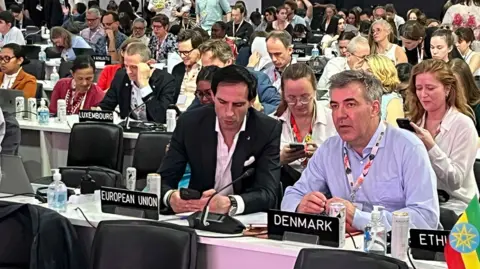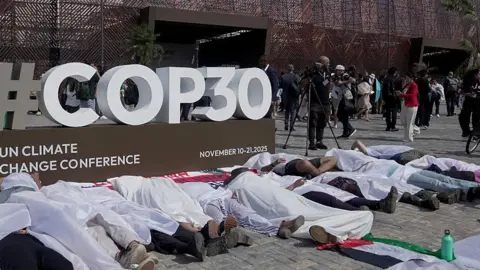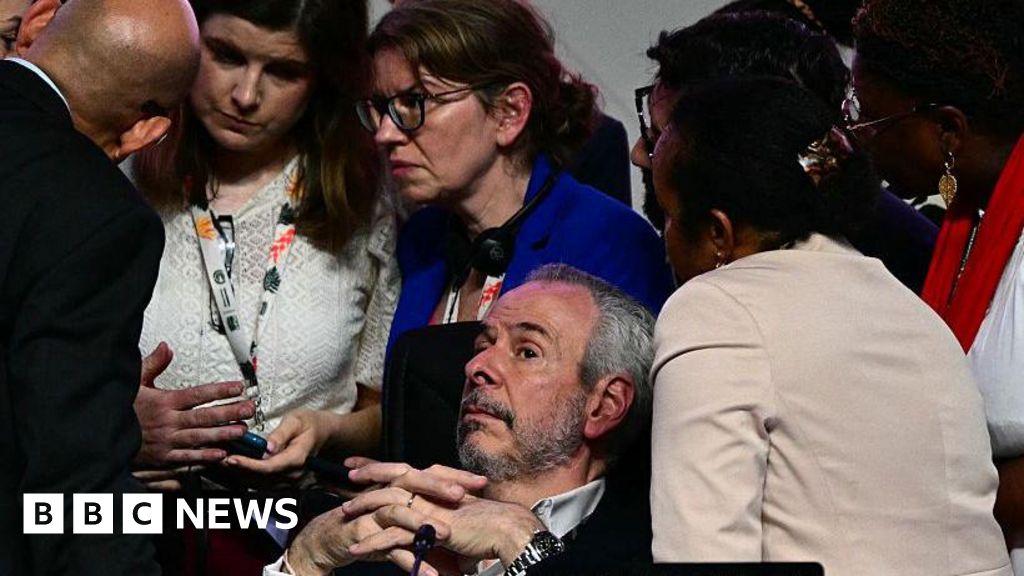Justin Rowlatt,Climate Editor and
Matt McGrath,Environment correspondent
 getty
gettyIn three decades of these meetings aimed at forging global consensus on how to prevent and deal with global warming, this will go down as among the most divisive.
Many countries were livid when COP30 in Belém, Brazil ended on Saturday with no mention of the fossil fuels that have heated up the atmosphere. Other nations – particularly those with most to gain from their continued production – felt vindicated.
The summit was a reality check on just how much global consensus has broken down over what to do about climate change.
Here are five key takeaways from what some have called the “COP of truth”.
Brazil – not their finest hour
The most important thing to come out of COP30 is that the climate ‘ship’ is still afloat
But many participants are unhappy that they didn’t get anything close to what they wanted.
And despite a great deal of warmth for Brazil and for President Luiz Inácio Lula da Silva, there is frustration with the way they ran this meeting.
Right from the off there seemed to be a gulf between what President Lula wanted this meeting to achieve, and what COP president President André Corrêa do Lago felt was possible.
So Lula talked of roadmaps away from fossil fuels to the handful of world leaders that came to Belém before the official start of the COP.
The idea was taken up by a number of countries including the UK, and within days there was a campaign to get this roadmap formally into the negotiations.
Do Lago wasn’t keen. His north star was consensus. He knew that forcing the issue of fossil fuels on the agenda would rupture that.
While the initial text for agreement had some vague references to things that looked like a roadmap, within days they were gone, never to return.
Colombia and the European Union and around 80 countries tried to find some language that would signal a stronger step away from coal, oil and gas.
To find consensus, do Lago convened a mutirão, a kind of Brazilian group discussion.
It made matters worse.
Negotiators from Arab countries refused to join huddles with those who wanted a pathway away from fossil energy.
The EU were given short shrift by major producers.
“We make energy policy in our capital not in yours,” the Saudi delegate told them in a closed-door meeting, according to one observer.
Ouch!
Nothing could bridge the gap – and the talks teetered on the verge of collapse.
Brazil came up with a face-saving idea of roadmaps on deforestation and fossil fuels that would exist outside the COP.
These were heartily applauded in the plenary halls – but their legal standing is uncertain.
 Tom Ingham/BBC
Tom Ingham/BBCEU had a bad COP
They are the richest group of nations still in the Paris Agreement but this COP has not been the European Union’s finest hour.
While they have been grandstanding on the need for a fossil fuel roadmap, they backed themselves into a corner on another aspect of the agreement that they eventually couldn’t get out of.
The idea of tripling money for climate adaptation was in the early text and survived into the final draft.
The wording was vague so that the EU didn’t object – but crucially the “tripling” word stayed in the text.
So when the EU tried to press the developing world to support the idea of a fossil fuel roadmap, they didn’t have anything to sweeten the deal – as the tripling concept was already baked in.
“Overall we are seeing a European Union that has been cornered,” said Li Shuo, from the Asia Society, a long-time observer of climate politics.
“This partly reflects the power shift in the real world, the emerging power of the BASIC and BRICs countries, and the decline of the European Union.”
The EU fulminated but apart from shifting the tripling of finance from 2030 to 2035, they had to go along with the deal, and they achieved very little on the fossil fuel front.
 Getty Images
Getty ImagesFuture of COP in question
The most persistent question asked here at COP30 over the two weeks was about the future of the ‘process’ itself.
Two often heard positions:
How barmy is it to fly thousands of people half-way around the world to sit in giant air-conditioned tents to argue about commas, and interpretations of convoluted words?
How ridiculous that the key discussions here, on the very future of the way that we will power our world occur at 3am in the morning among sleep deprived delegates who haven’t been home in weeks?
The COP idea served the world well in ultimately delivering the Paris climate agreement – but that was a decade ago and many participants feel that it doesn’t have a clear, powerful purpose anymore.
“We can’t discard it entirely,” Harjeet Singh, an activist with the Fossil Fuel Treaty Initiative, told BBC News.
“But it requires retrofitting. We will need processes outside this system to help complement what we have done so far.”
Energy costs and the valid questions about how countries reach net zero emissions have never been more critical – yet the COP idea seems very far removed from the day to day lives of billions of people.
It is a consensus process that comes from a different era. We are not in that world anymore.
Brazil recognised some of these issues and tried to make this an “implementation cop” and put a lot of focus on the “energy agenda”. But no one really knows what those ideas actually meant.
COP leaders are reading the room – they are trying to find a new approach that is needed or this conference will lose all relevance.
Trade comes in from the cold
For the first time global trade became one of the key issues at these talks. There was an “orchestrated” effort to raise it in every negotiating room, according to veteran COP-watcher Alden Meyer of the climate think-tank E3G.
‘What’s that got to do with climate change?’ you are probably thinking.
The answer is that the European Union is planning to introduce a border tax on certain high-carbon products like steel, fertiliser, cement, and aluminium and lots of its trading partners – notably China, India and Saudi Arabia aren’t happy about it.
They say it isn’t fair for a big trading bloc to impose what they call a one-sided – “unilateral” is the technical term – measure like this because it will make the goods they sell into Europe more expensive – and therefore less competitive.
The Europeans say that’s wrong because the measure is not about stifling trade but about cutting planet-warming gases – tackling climate change. They already charge their own producers of these products a fee for the emissions they create and say the border tax is a way to protect them from less environmentally friendly but cheaper imports from abroad.
If you don’t want to pay our border tax, they say, just charge emissions fees on your polluting industries – collect the money yourselves.
Economists like that idea because the more expensive it is to pollute, the more likely we all are to switch to clean energy alternatives. Although – of course – it also means we’ll pay more for any goods we buy that contain polluting materials.
The issue was resolved here in Brazil with a classic COP compromise – pushing the discussions into future talks. The final agreement launched an on-going dialogue on trade for future UN climate talks, involving governments as well as other actors like the World Trade Organization.
 Tom Ingham/BBC
Tom Ingham/BBCTrump gains by staying away – China gains by staying quiet
The world’s two biggest carbon emitters, China and the US, had similar impacts on this COP but achieved them in different ways.
US President Donald Trump stayed away, but his stance emboldened his allies here.
Russia, normally a relatively quiet participant, was to the fore in blocking efforts on roadmaps. And while Saudi Arabia and other major oil producers were predictably hostile to curbing fossil fuels, China stayed quiet and concentrated on doing deals.
And ultimately, say experts, the business China is doing will outdo the US and their efforts to sell fossil fuels.
“China kept a low political profile,” says Li Shuo from the Asia Society.
“And they focussed on making money in the real world.”
“Solar is the cheapest source of energy, and the long term direction is very clear, China dominates in this sector and that puts the US in a very difficult position.”





